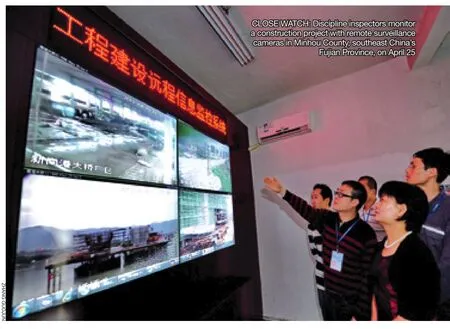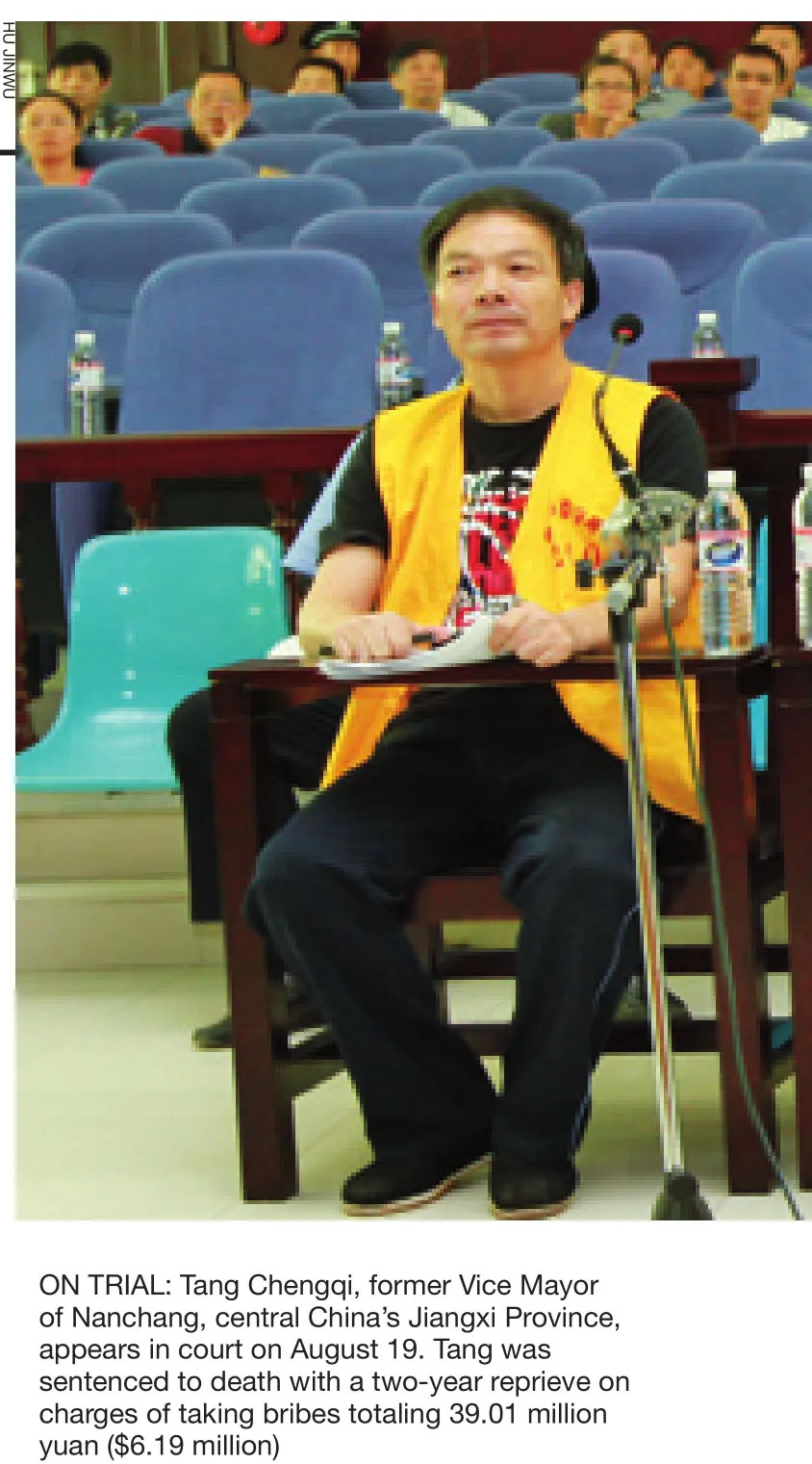A Determined War on Graft
2012-10-14ChinahasmadestridesinsnuffingoutcorruptionsystematicallyoverthepastdecadeByLiLi
China has made strides in snuffing out corruption systematically over the past decade By Li Li
A Determined War on Graft
China has made strides in snuffing out corruption systematically over the past decade By Li Li
China will impose a new five-year plan to tackle corruption following the upcoming national congress of the Communist Party of China (CPC), senior official He Guoqiang said on August 21. The new work plan for 2013 to 2018 would be the second of its kind as the first one was released in 2008.
He, a member of the Standing Committee of the Political Bureau of the CPC Central Committee, expressed readiness to improve anti-corruption efforts, describing the improvements as a “dynamic and long-term strategic project.”
The 18th CPC National Congress will find new ways to prevent corruption both now and in the future, said He, who is also head of the CPC Central Commission for Discipline Inspection (CCDI), the Party’s anti-graft watchdog.
He said China has always paid great attention to fighting corruption and creating a clean government, adding that the country has created its own unique methods to combat corruption.
The formation of the new five-year plan should be based on the results of the previous plan, as well as past experience, He said, urging discipline officials to prioritize solving problems that are widely faced by the public and find new ways to suppress and prevent corruption.
According to the website of theNandu Dailynewspaper, the CPC’s new anti-graft plan could come out in the middle of next year at the earliest.
Ren Jianming, an associate professor at the School of Public Policy and Management of Tsinghua University, was quoted byNandu Dailyas saying that the drafting of the work plan started as early as May 2010 and scholars have been invited to carry out surveys and studies, whose results are used as references.
Li Xueqin, head of the CCDI’s Research Division, told Xinhua News Agency that while the first five-year work plan was to establish an anti-corruption mechanism, the next five years would be spent in “perfecting that mechanism” with a focus on preventing abuses of power.
Intensified crackdown
Li said that in the first 10 years after the Party declared a war on corruption in 1993, the strategy was to curb the rising trend of corruption, and the main tasks were upholding leaders’ integrity and investigating cases. In the past 10 years, however, the main focus has shifted to prevention, and to eradicating the roots of corruption, according to Li.
Since the 16th National Congress of the CPC in 2002, the Party has taken various measures to combat corruption through developing a set of systems, mechanisms and methods to restrict and monitor the exercise of power.
Jiang Hui, a research fellow with the Chinese Academy of Social Sciences, told Xinhua that the country’s leadership has placed the fight against corruption high on its agenda over the past 10 years.
In a speech last July, President Hu Jintao, also General Secretary of the CPC Central Committee, warned that corruption is one of the growing dangers that confront the Party and it has become more important and urgent for the Party to police itself and impose strict discipline on its members.
In his speech at the Party School of the CPC Central Committee on July 23, Hu again listed fighting corruption unswervingly as one of the efforts that must be continued to promote Party building.
循证护理起源于20世纪90年代,该种护理模式是一种新型的护理模式,能够根据个人的护理经验结合患者的实际情况,从而制定出完整的护理方案,其能够对现代化的科学依据进行应用,从而为患者提供更加优质的服务[1]。就我国当下护理模式而言,循证护理应用并不广泛。通过循证护理系列培训可推广该种护理模式,并对提高我国护理质量有着重要意义,同时,该种护理模式对改善护患关系起到促进作用,从而能够使我国紧张的护患关系得到有效缓解[2]。文章主要探究应用循证护理系列培训指导临床护理实践的效果,探究结果将在下文中进行详细报告。

From December 2002 to June 2007, a total of 518,484 CPC members were punished according to Party disciplines. During the same period, the CPC’s disciplinary organs across the country also registered 677,924 cases and settled 679,846 ones including those registered before 2002, according to the CCDI’s report to the 17th CPC National Congress.
During those five years, the CPC also disciplined several senior officials including former Shanghai Party chief Chen Liangyu, former Deputy Secretary of the CPC Shandong Provincial Committee Du Shicheng, and former Director of the State Food and Drug Administration Zheng Xiaoyu.
Zheng was sentenced to death by a court in May 2007 after being found guilty of taking 6.49 million yuan ($1.03 million) in bribes and dereliction of duty and was executed in July 2007.
More than 60 officials at the ministerial and provincial levels had been punished for discipline violations since the Party’s last national congress in 2007. These high-level officials were among 600,000 people who faced punishment for violating Party and government discipline standards, according to a statement from the CCDI on July 26.
Among them, more than 200,000 were transferred to prosecutors for involvement in legal infringements, the CCDI statement said.
Former Minister of Railways Liu Zhijun was expelled from the CPC following an investigation into allegations of corruption in May. His case has been handed over to judicial departments.
On July 2, Liu Zhuozhi, former Vice Chairman of Inner Mongolia Autonomous Region, was convicted of taking bribes totaling 8.17 million yuan ($1.29 million) and sentenced to life imprisonment.
China has adopted the principle of addressing both symptoms and root causes of corruption, enforcing comprehensive treatment, simultaneously stressing punishment and prevention while giving priority to prevention, according to the white paper.
The document also quotes a survey conducted by the National Bureau of Statistics (NBS), which shows that the Chinese public’s overall satisfaction rate of the government’s efforts to combat corruption and build a clean government rose steadily from 51.9 percent in 2003 to 70.6 percent in 2010. Another NBS survey in the white paper shows that 83.8 percent of Chinese thought corruption had been kept down to “varying extents” in 2010.
Prevention—a priority
Great efforts have been made in improving the systems to prevent corruption and restrict the power of officials, Li said.
Over the past decade, discipline inspection agencies have initiated supervision and inspection on related departments and officials since the major government action started, he said.
Citing the Beijing Olympic Games in 2008 and the World Expo in Shanghai in 2010 as examples, he said inspectors were sent to supervise the preparation of the events from the beginning.
“Checking departments and officials in charge of major projects has become a regular form of supervision,” Li said. “Such precautionary measures have proven more effective than handing down punishments when damages have been done.”
Similar inspection teams were also sent by the Central Government around China to monitor local governments’ use of funds for stimulating the economy following the outbreak of the global financial crisis in 2008, the post-earthquake reconstruction projects and use of donations in Wenchuan, Sichuan Province, and Yushu, Qinghai Province, and the preparation of Asian Games in Guangzhou, capital of Guangdong Province, in 2010.
The CPC started large-scale efforts to curb corruption among Party and government officials about two decades ago and, in the past decade, efforts have been stepped up, Li said.
The CCDI launched several special campaigns targeting outstanding problems, such as excessive overseas travels funded by government, bribery in contracting of construction projects, securities and assets that should but fail to be listed in accounts.
By 2011, the CCDI had investigated about 21,000 graft cases after inspecting more than 425,000 government-funded construction projects across the country, and exposed more than 60,000 off-book accounts leading to punishment of more than 10,000 officials.
The Party also responded fast to cases drawing severe public complaints, such as those related to workplace safety, food safety and environmental pollution.

Over the past five years, more than 700 officials were punished for being responsible for workplace accidents.
Also, the country founded its first national corruption prevention bureau in 2007 to reform the supervision system on officials and develop new anti-corruption policies.
A string of policies to improve government transparency, curb the misuse of power and police the behaviors of senior officials have been issued over the past few years.
In February 2010, the CPC Central Committee issued a code of ethics for CPC cadres to follow to ensure clean practice in their work. The guidelines specify 52 unacceptable practices with respect to CPC leaders and cadres of various levels, including accepting cash or financial instruments as gifts, and using their influence to benefit their spouses, children or “special concerned persons” with regards to their employment, stock trading or business.
“The battle against corruption will be tough and tedious, but with persistent efforts, the future will be bright,” Li said.
